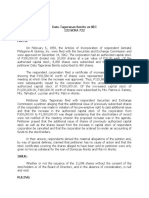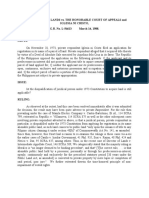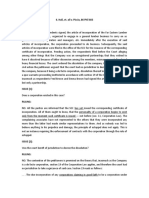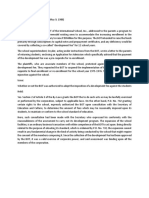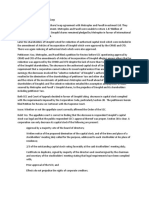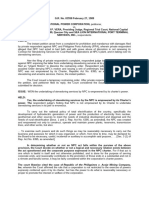Napocor Vs Vera
Napocor Vs Vera
Uploaded by
Lindsay MillsCopyright:
Available Formats
Napocor Vs Vera
Napocor Vs Vera
Uploaded by
Lindsay MillsOriginal Description:
Original Title
Copyright
Available Formats
Share this document
Did you find this document useful?
Is this content inappropriate?
Copyright:
Available Formats
Napocor Vs Vera
Napocor Vs Vera
Uploaded by
Lindsay MillsCopyright:
Available Formats
National Power Corp. vs.
Vera
G.R. No. 83558; February 27, 1989
FACTS:
Sea Lion International Port Services, private respondent, filed a
complaint for prohibition and mandamus against petitioner NPC alleging that
it had acted in bad faith in not renewing its contract for stevedoring services
for its plant and in taking over its stevedoring services. Respondent judge
issued a restraining order against NPC enjoining the latter from undertaking
stevedoring services at its pier. Consequently, NPC filed an "Urgent Motion" to
dissolve the restraining order, asserting that respondent judge had no
jurisdiction to issue the order and private respondent, whose contract with
NPC had expired prior to the commencement of the suit, failed to establish a
cause of action for a writ of preliminary injunction. The respondent judge
denied the NPCs motion and issued a TRO after finding that NPC was not
empowered by its Charter to engage in stevedoring and arrastre services.
ISSUE:
WON the undertaking of stevedoring services is empowered by the
NPCs charter powers.
HELD:
YES. To carry out the national policy of total electrification of the
country, the NPC was created and empowered not only to construct, operate
and maintain power plants, reservoirs, transmission lines, and other works,
but also to exercise such powers and do such things as may be reasonably
necessary to carry out the business and purposes for which it was organized,
or which, from time to time, may be declared by the Board to be necessary,
useful, incidental or auxiliary to accomplish said purpose.
In determining whether or not an NPC act falls within the purview of the
above provision, the Court must decide whether or not a logical and necessary
relation exists between the act questioned and the corporate purpose
expressed in the NPC charter. For if that act is one which is lawful in itself and
not otherwise prohibited, and is done for the purpose of serving corporate
ends, and reasonably contributes to the promotion of those ends in a
substantial and not in a remote and fanciful sense, it may be fairly considered
within the corporation's charter powers.
You might also like
- Board of Liquidators v. Kalaw, G.R. No. L-18805, 20 Scra 987, 14 August 1967Document3 pagesBoard of Liquidators v. Kalaw, G.R. No. L-18805, 20 Scra 987, 14 August 1967Pamela Camille Barredo100% (1)
- Remo, Jr. V IACDocument2 pagesRemo, Jr. V IACMasterboleroNo ratings yet
- Bases Conversion and Development Authority VsDocument1 pageBases Conversion and Development Authority VsJermone MuaripNo ratings yet
- Prime White Cement Vs IacDocument2 pagesPrime White Cement Vs IacNegou Xian TeNo ratings yet
- Ang vs. AngDocument3 pagesAng vs. AngVeronica ChanNo ratings yet
- J.F. Ramirez v. The Orientalist CorporationDocument2 pagesJ.F. Ramirez v. The Orientalist CorporationRafaelNo ratings yet
- Napocor v. Vera DIGESTDocument3 pagesNapocor v. Vera DIGESTkathrynmaydevezaNo ratings yet
- Western Institute v. SalasDocument3 pagesWestern Institute v. SalasTricia SandovalNo ratings yet
- 11 Teresa Electric Power Co. Inc. v. Public Service Commission and Filipinas Cement CorporationDocument2 pages11 Teresa Electric Power Co. Inc. v. Public Service Commission and Filipinas Cement CorporationArnel ManalastasNo ratings yet
- Top Weld Manufacturing Vs ECAD - Foreign CorporationsDocument2 pagesTop Weld Manufacturing Vs ECAD - Foreign Corporationskaira marie carlosNo ratings yet
- Daisy Lopez Realty Vs FontechaDocument1 pageDaisy Lopez Realty Vs FontechaAllenNo ratings yet
- Madrigal Co V ZamoraDocument2 pagesMadrigal Co V ZamoraJoesil Dianne SempronNo ratings yet
- Powers v. Marshall, 161 SCRA 176Document2 pagesPowers v. Marshall, 161 SCRA 176rodel talaba100% (2)
- Datu Tagorana VS SecDocument2 pagesDatu Tagorana VS SecallynNo ratings yet
- 156 - Associated Bank vs. CADocument2 pages156 - Associated Bank vs. CAmimiyuki_100% (2)
- Luneta Motor Company V AD Santos, Inc Et AlDocument2 pagesLuneta Motor Company V AD Santos, Inc Et AlMaria Aurora Camille100% (1)
- Corporation Law Digest Atty. RanadaDocument85 pagesCorporation Law Digest Atty. RanadaFederico Dipay Jr.100% (1)
- Power of Corporations - in GeneralDocument2 pagesPower of Corporations - in GeneralMIKHAEL MEDRANONo ratings yet
- Carlos Vs Mindoro Sugar DigestDocument1 pageCarlos Vs Mindoro Sugar DigestMarry LasherasNo ratings yet
- Luneta Motor v. A.D. Santos DigestDocument2 pagesLuneta Motor v. A.D. Santos DigestAnit EmersonNo ratings yet
- Tan vs. Sec (206 Scra 740)Document4 pagesTan vs. Sec (206 Scra 740)Rivera Meriem Grace MendezNo ratings yet
- 31 Tramat Mercantile vs. CADocument1 page31 Tramat Mercantile vs. CALoren Bea TulalianNo ratings yet
- Edward Nell Co. v. Pacific Farms, Inc. DigestDocument1 pageEdward Nell Co. v. Pacific Farms, Inc. DigestBinkee VillaramaNo ratings yet
- Meralco v. TEAMDocument3 pagesMeralco v. TEAMJayson RacalNo ratings yet
- Lopez Realty V Fontecha Case DigestDocument3 pagesLopez Realty V Fontecha Case DigestRae ManarNo ratings yet
- Hall, Et. All v. Piccio, 86 Phil 603Document2 pagesHall, Et. All v. Piccio, 86 Phil 603Charmila SiplonNo ratings yet
- Gala Vs Ellice AgroDocument2 pagesGala Vs Ellice AgroJennilyn Tugelida100% (1)
- Cruz v. DalisayDocument1 pageCruz v. DalisayJL A H-DimaculanganNo ratings yet
- Atty Francisco Vs Del CastilloDocument24 pagesAtty Francisco Vs Del CastilloGfor FirefoxonlyNo ratings yet
- Alhambra Cigar vs. SECDocument2 pagesAlhambra Cigar vs. SECLilibeth Dee Gabutero67% (3)
- Stockholders of F. Guanzon and Sons, Inc. Vs Register of Deeds of ManilaDocument2 pagesStockholders of F. Guanzon and Sons, Inc. Vs Register of Deeds of ManilaReah Shyne RefilNo ratings yet
- Detective Protective Bureau Inc Vs Hon. CloribelDocument2 pagesDetective Protective Bureau Inc Vs Hon. CloribelLiaa AquinoNo ratings yet
- Emilio Cano Enterprises v. CIRDocument1 pageEmilio Cano Enterprises v. CIRAaron James PuasoNo ratings yet
- 104 - Powers V MarshallDocument1 page104 - Powers V MarshallJoshua RiveraNo ratings yet
- 37 Soriano v. CA DigestDocument2 pages37 Soriano v. CA DigestGloria Trillo100% (1)
- 01 Francisco V GSISDocument2 pages01 Francisco V GSISSam Sy-HenaresNo ratings yet
- 68 - Detective and Protective Bureau, Inc. v. CloribelDocument1 page68 - Detective and Protective Bureau, Inc. v. Cloribeljosh9riveraNo ratings yet
- 9 Teresa Electric Power v. PSCDocument2 pages9 Teresa Electric Power v. PSCJul A.No ratings yet
- Board of Directors V TanDocument2 pagesBoard of Directors V TanTrxc Magsino100% (1)
- San Miguel vs. Khan (Valera)Document2 pagesSan Miguel vs. Khan (Valera)ASGarcia24No ratings yet
- 002 Universal Mills Corp. v. Universal Textile Mills Inc.Document2 pages002 Universal Mills Corp. v. Universal Textile Mills Inc.joyce100% (3)
- Lozano Vs Delos SantosDocument2 pagesLozano Vs Delos SantosJan MartinNo ratings yet
- Lanuza Et Al V CA Et AlDocument2 pagesLanuza Et Al V CA Et AlJeunaj LardizabalNo ratings yet
- 106 Madrigal - Co. v. ZamoraDocument1 page106 Madrigal - Co. v. Zamoramimiyuki_No ratings yet
- 84 - Uichico Vs NLRCDocument2 pages84 - Uichico Vs NLRCmimiyuki_No ratings yet
- Gov of The Philippines V El HogarDocument4 pagesGov of The Philippines V El HogarZoe Velasco100% (2)
- PDF 6 Case Republic Planters Bank Vs Agana Corporation LawDocument2 pagesPDF 6 Case Republic Planters Bank Vs Agana Corporation LawPatatas SayoteNo ratings yet
- Carlos Vs Mindoro SugarDocument1 pageCarlos Vs Mindoro SugarMitchi JerezNo ratings yet
- 80delta Motors V Mangosing - Power To Sue or Be SuedDocument1 page80delta Motors V Mangosing - Power To Sue or Be SuedIanNo ratings yet
- International Express Travel vs. CADocument1 pageInternational Express Travel vs. CAAllenMarkLuperaNo ratings yet
- Case # 26 - Enano-Bote v. Alvarez - G.R. No. 223572Document1 pageCase # 26 - Enano-Bote v. Alvarez - G.R. No. 223572Mikhael Ong100% (1)
- Terelay Investment Vs Yulo GR No. 160924aug 5, 2015 FactsDocument1 pageTerelay Investment Vs Yulo GR No. 160924aug 5, 2015 FactsRose Faith Ibarra100% (1)
- Metroplex Berhad V SinoPhil CorpDocument2 pagesMetroplex Berhad V SinoPhil CorpVerne Sagun100% (1)
- Macasaet V FranciscoDocument1 pageMacasaet V FranciscoMarioneMaeThiam100% (3)
- National Exchange V DexterDocument1 pageNational Exchange V DexterReghz De Guzman PamatianNo ratings yet
- PAT Ch1 - Litonjua V FernandezDocument1 pagePAT Ch1 - Litonjua V FernandezAlthea M. SuerteNo ratings yet
- Grace Christian High School Vs Court of AppealsDocument11 pagesGrace Christian High School Vs Court of AppealsAlegria Iris100% (1)
- 16 - UNITED COCONUT PLANTERS BANK, VS. SECRETARY OF JUSTICE, OFFICE OF THE CHIEF PROSECUTOR, TIRSO ANTIPORDA, JR. AND GLORIA CARREON, G.R. No. 209601, January 12, 2021Document2 pages16 - UNITED COCONUT PLANTERS BANK, VS. SECRETARY OF JUSTICE, OFFICE OF THE CHIEF PROSECUTOR, TIRSO ANTIPORDA, JR. AND GLORIA CARREON, G.R. No. 209601, January 12, 2021Ian Palma67% (3)
- NPC vs. VERADocument1 pageNPC vs. VERAitablemjNo ratings yet
- Case Digests (Title-Iv)Document19 pagesCase Digests (Title-Iv)Yhobel May AlejandriaNo ratings yet
- Zafra Vs PeopleDocument2 pagesZafra Vs PeopleLindsay MillsNo ratings yet
- Hontiveros Vs RTCDocument4 pagesHontiveros Vs RTCLindsay MillsNo ratings yet
- Certification ElectionDocument4 pagesCertification ElectionLindsay MillsNo ratings yet
- Rights To Filiation - CivRev1Document82 pagesRights To Filiation - CivRev1Lindsay MillsNo ratings yet
- PhyllotaxyDocument11 pagesPhyllotaxyLindsay MillsNo ratings yet
- Poseidon Fishing Vs NLRCDocument2 pagesPoseidon Fishing Vs NLRCLindsay Mills100% (2)
- Canon 1-6Document6 pagesCanon 1-6Lindsay Mills100% (1)
- Home PlantsDocument1 pageHome PlantsLindsay MillsNo ratings yet
- Perla Palma Vs CADocument8 pagesPerla Palma Vs CALindsay Mills100% (1)
- PNB Vs CA 2009Document2 pagesPNB Vs CA 2009Lindsay MillsNo ratings yet
- Eagle Star Security Services Vs MirandoDocument1 pageEagle Star Security Services Vs MirandoLindsay MillsNo ratings yet
- Suntay Vs Cojuanco-SuntayDocument2 pagesSuntay Vs Cojuanco-SuntayLindsay MillsNo ratings yet
- Quimen Vs CaDocument4 pagesQuimen Vs CaLindsay MillsNo ratings yet
- Miriam Defensor Santiago Vs COMELECDocument3 pagesMiriam Defensor Santiago Vs COMELECLindsay MillsNo ratings yet
- 2 Gatbonton Vs NLRC MapuaDocument2 pages2 Gatbonton Vs NLRC MapuaLindsay MillsNo ratings yet













